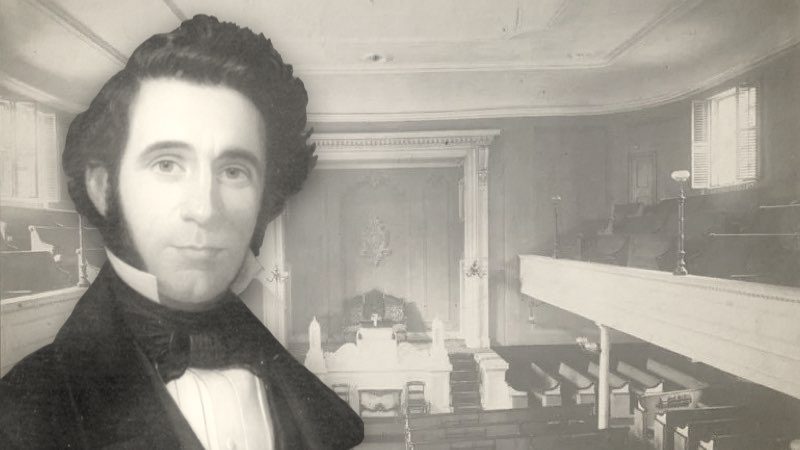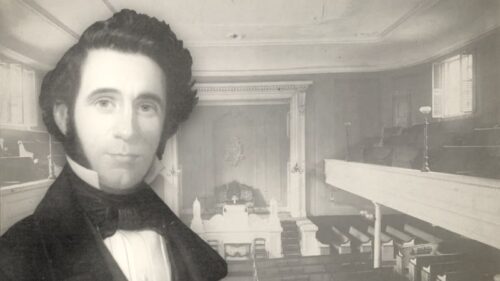-
6 Church Government
Is there any particular form of Church government revealed in the New Testament? And if so, what is it? These questions will be variously answered by Christian scholars and Bible students. Some hold that no specific form can be deduced from the sacred records, and that no one form is best suited for all people and for all places; and that it was purposely left for Christian wisdom and prudence, guided by experience, to decide that question. But the greater part believe that a specific form is at least outlined in the New Testament; and, naturally enough, each one believes the form with which he is identified is that divinely given form. It may be safely allowed that no one class or company of Christians…
-
Chapter 5—On Baptism, Answering The Charge Of Callousness
Mr. Bridgman: "The preacher said, indeed, that he respected our feelings, yet at the same time dealt out with all his vehemence, hard blows, not, indeed, of sound argument, but which certain sophists know best suit weak minds, merely hard words and positive assertions." My Reply: 1. You make a mistake about my saying that I respected your feelings, for I neither said, thought, nor meant so; but that I loved my Independent brethren in the faith of Christ, although I condemned infant sprinkling to be sent back to its mother at Rome, and I am still of the same mind. My work, my aim, and my object was to state what I believe in the presence of God, and on the text of the…
-
5 Christian Ordinances
Christian ordinances are defined to be "institutions of divine authority relating to the worship of God, under the Christian Dispensation." In this general sense there are various ordinances; since preaching and hearing the word, prayer, singing, fasting, and thanksgiving may all be considered as institutions of divine authority. But in a narrower and a more distinctive sense it has been common to call Baptism and the Lord's Supper by this name, and to say they are the only Christian ordinances committed to the churches, and are for perpetual observance. These rites are also by some called sacraments the number of which the Catholic Church has increased to seven, including, with Baptism and the Eucharist, Confirmation, Penance, Extreme unction, Matrimony, and Orders. But in the sense…
-
Chapter 4—On Baptism, Answering The Charge Of Inappropriateness
Mr. Bridgman: "I should say to the preacher concerned in this censure, my brother, let us do to others as we would they in like circumstances should do to us. And as a Baptist (so called) would not have patience to hear a Pseudo-Baptist rant on a general occasion about infant sprinkling; so neither vice versa." My Reply: What have I done, but honestly spoken out principle at a proper place, occasion, and time? It was a Baptist ordination, and I was published to state sentiments according to my well known public profession and personal belief, and I did so, and will leave the public to judge if I should not have departed from the laws of honesty on such an occasion if I had…
-
4 Church Officers
Every form of organized society, whether civil, social or religious, is supposed to have officers, duly constituted to execute the laws, administer the government, and secure the ends contemplated by the organization. The Church is a commonwealth, a society, a family, and has its officers as leaders and administrators of its affairs. Officers, however, are not essential to the existence of a State, nor are they to the existence of a Church. They are nevertheless important to their highest efficiency, and the best exercise of their legitimate functions. The State does not lapse and cease to be, because its executive dies, resigns, or is removed. Nor does the Church cease to be a Church though it may be without officers. It was a Church before…
-
Chapter 3—On Baptism, Answering The Charge Of Disorderliness
Mr. Bridgman: "But as an ordination is a service similar to the first opening or anniversary of a chapel, I for one, nor I alone by many, consider the preacher quite as much breaking the rule of the Apostle, 'Let all things be done decently and in order,' as was Joseph in sprinkling an infant in the presence of John Andrew the dipper." My Reply: I never did know, and you are the first person who ever said within my knowledge, that an ordination is a similar service to that of opening a chapel, or to that of an anniversary: for, 1. At an ordination the church is required to give an account of the leadings of Providence, relative to their chosen minister, and this…




